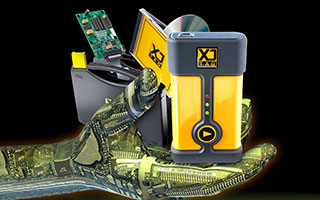- XJTAG provides test and development tools for high speed programming of Micron Phase Change Memory.
- XJTAG produces white paper on high speed programming of non-volatile Memories.
Cambridge, England, July 20, 2010 — XJTAG today announced that it is the first to provide support for Micron Phase Change Memory (PCM).
PCM enables enhanced system performance, and is programmed in situ after the board is assembled. XJTAG, working with Micron, has developed a solution to program PCM at close to its maximum programming speed using the XJTAG boundary scan system. It will allow customers to program PCM quickly on production lines or in development labs. This builds on XJTAG’s successful XJFlash solution for high-speed programming of Flash memories.
“PCM is a compelling new memory technology that combines the best attributes found in NOR, NAND and DRAM,” said Jeff Bader, senior director of marketing for Micron’s embedded group. “Because PCM is a new technology, it is imperative that we build a strong ecosystem of support to further customer adoption. We are pleased with the work XJTAG has done in building a programming solution, enabling PCM to be easily deployed in a production environment.”
The XJTAG boundary scan system is fast and easy to use for development or production, with features such as its high-level test-description language, graphical application helping engineers to visualise their circuits, and automated connectivity tests and DFT analysis. XJTAG’s innovative software calculates how to utilise the boundary scan chain to maximise test coverage and accelerate programming of devices such as memories and PLDs.
“In addition to being the first to support this important new memory technology, we have also achieved the shortest possible in-system programming time,” commented Simon Payne, CEO, XJTAG. “This is great news for product developers as they need convenient and effective methods for in situ programming and reprogramming of memories at very high speeds.”
Used in conjunction with the XJTAG boundary scan debug, test and programming system, XJFlash can be used to program and verify PCM devices provided there is an FPGA or CPU on the target board and this is connected up to the JTAG chain correctly.
“With this enhancement to the XJTAG system, we can now provide high speed programming for Micron PCM devices,” added Simon Payne. “This means that engineers designing complex boards containing BGA, FPGA and flash devices can do away with a separate flash programmer and utilise the full power of the XJTAG system to debug, test and program their designs throughout the product lifecycle.”
A white paper explaining high speed programming of non-volatile memories is available from the XJTAG website at www.xjtag.com.
XJTAG contact details: XJTAG, St John’s Innovation Centre, Cowley Road, Cambridge CB4 0WS, UK.
Telephone +44 (0) 1223 223007, fax +44 (0) 1223 223009 or email enquiries@xjtag.com. Alternatively, visit www.xjtag.com.
About XJTAG (www.xjtag.com)
XJTAG is a leading global supplier of boundary scan development systems compliant with IEEE 1149 standards. XJTAG allows hardware development and manufacturing processes to be shortened significantly, through early development of re-useable tests. XJTAG development systems enable rapid hardware debug and test of both JTAG and non-JTAG (cluster) devices, such as SDRAMs, Ethernet controllers, video interfaces, Flash memories, FPGAs and microprocessors. XJTAG also enables In-System Programming of FPGAs, CPLDs and Flash memories.
XJTAG’s headquarters are in Cambridge, UK, with a network of distributors across Europe, the Far East, North and South America, the Middle East and Australasia. See: www.xjtag.com
Image (click for high resolution)
XJTAG supports Micron Phase Change Memory with JTAG test tools






